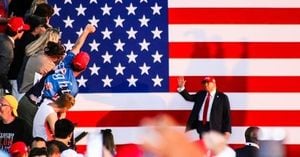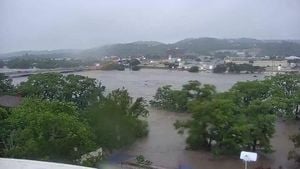In a development that has stirred significant controversy, a large sum of cash and multiple high-end designer bags were reportedly discovered during a police search of former Minister of Interior and Safety Lee Sang-min's residence earlier this year. The revelations, which surfaced in July 2025, have raised questions about the source and legality of the funds, as well as the implications for Lee amid ongoing investigations into alleged insurrection-related activities.
Back in February 2025, the Police National Agency's Anti-Corruption Special Investigation Unit conducted a search of Lee Sang-min’s home as part of an inquiry into accusations that he ordered the shutdown and suspension of media outlets during a state of emergency. According to reports from KBS and JTBC, the search uncovered eight to nine luxury Hermes bags packed with stacks of 50,000 won bills, estimated to amount to hundreds of millions of Korean won. Some of these bags were brand new, with tags still attached, suggesting recent acquisition.
Despite the substantial amount of cash and the high-value items found, police did not seize the money or the bags during the raid. The reason, as revealed by police investigators questioned by the Special Prosecutor’s team, was that the search warrant issued only covered allegations related to media outlet suspensions and did not extend to the cash or bags. One investigator reportedly stated, "We discovered bundles of cash, but could not seize them as they were outside the scope of the search warrant." This limitation has fueled suspicions about potential evidence being overlooked or mishandled during the initial investigation.
Lee Sang-min’s legal team has firmly denied the reports of large cash holdings and luxury bags at his residence. When questioned by KBS, they responded, "We were present during the search and there was no such fact." Similarly, Lee himself has stated that the money reportedly found was left by an acquaintance who visited and insisted it was neither political nor illegal funds. However, he has not provided detailed information about the identity of this acquaintance, the nature of the cash, or the circumstances under which it was delivered, leaving many questions unanswered.
The controversy deepened when a cleaning service employee reportedly discovered several envelopes containing tens of millions of won during a routine cleaning of Lee’s official residence. This discovery was promptly reported to relevant authorities, adding to the growing scrutiny. Government officials have confirmed that a verification process regarding the nature of the cash is underway and have not ruled out further investigations if necessary. The exact origin and purpose of the money remain unclear, and the issue is expected to become a focal point in discussions about compliance with the Public Officials' Anti-Graft Act, which governs ethical conduct and financial disclosures for public officials.
Political opponents have seized on the revelations, condemning the situation as "conduct unbecoming of the public's eye" and demanding a thorough explanation from Lee and the authorities. Some factions within the opposition have even called for Lee’s resignation, citing the need for accountability and transparency. The debate highlights the broader challenges faced by government officials in maintaining public trust amid allegations of impropriety and corruption.
Meanwhile, the investigation into Lee Sang-min’s alleged role in the insurrection-related charges, including the directive to cut power and water to media outlets, has been transferred to a Special Prosecutor’s office. This move came after the prosecution requested supplementary investigations, suggesting that the initial police inquiry required further evidence and clarification. The Special Prosecutor's team has already begun summoning police investigators involved in the February search for questioning and plans to call Lee in for intensive questioning soon.
The Special Prosecutor’s office is particularly interested in determining whether the discovered cash has any connection to the alleged insurrection or emergency measures. This angle is critical, as it could implicate Lee in broader illegal activities beyond the initial accusations. The fact that the cash was not seized earlier due to procedural limitations has complicated the investigation, but the Special Prosecutor is expected to pursue all leads rigorously.
This case underscores the complexities of legal and ethical scrutiny faced by high-ranking officials in South Korea. The intersection of political power, alleged insurrection activities, and unexplained wealth creates a potent mix that has captivated public attention. As the investigation unfolds, the pressure mounts on Lee Sang-min to provide clear answers and for the authorities to ensure a transparent and thorough inquiry.
For now, the public awaits the Special Prosecutor's next moves, with the hope that the truth behind the cash and luxury items found at Lee’s residence will come to light. Whether these revelations will lead to legal consequences or political fallout remains to be seen, but one thing is certain: the scrutiny on Lee Sang-min and the broader implications of this case are far from over.




